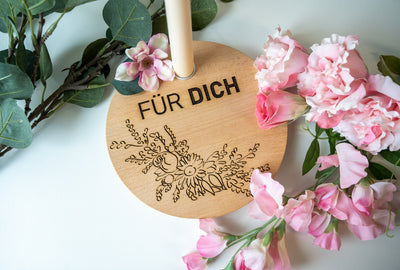Who of us does not know the unpopular group work from school days? In the end everything is up to you anyway, or you were lucky enough to be supported by the others. It often doesn't seem to be much different in the workplace. Despite some difficulties, teamwork is an important and effective tool in almost every company. In today's Mr Beam Blog we take a closer look at what characterizes teamwork and how exactly it can work.
What does TEAM mean?

While the word team still referred to a team of draft animals in front of a carriage in the 19th century , it is hard to imagine today's work context without it.
A team is a group of people who work together on projects or tasks over a certain period of time. The individual team members take on different roles, common behavioral standards develop and - particularly important for good teamwork - a sense of unity. Because we humans are and will remain social beings.
Every team goes through different phases of team development . Tuckman divided them into 4 stages:
- Forming: getting to know each other and setting goals
- Storming: Conflicts and competitive behavior can arise after the distribution of tasks
- Norming: After the conflicts have been successfully resolved, the group strengthens and norms are established
- Performing: Willingness to perform and efficiency are at their peak. There are constructive and creative solutions for all emerging issues.
After that, an order is created in which each member finds his or her place.

What is teamwork and what does it mean?

" Everyone has to pull together, doesn't they?"
The French agricultural engineer Maximilian Ringelmann unknowingly started the first teamwork experiment in the 19th century. When he wanted to study how well humans, machines and horses could pull loads, he found that the pulling power of horses and machines can be added together, but that of humans cannot. The more people " pull together", the lower the individual physical performance.
Even work teams often do not exploit their full potential. Especially with virtual teams, individual members can hide in the group, which is also called social loafing.
Nevertheless, teamwork can be found in almost every company. The industrial magnate Andrew Carnegie , who was not exactly known for his heart for his employees, recognized the importance of teamwork more than 100 years ago:
“The only thing that really sets a company apart is the ability of its people to work together.
So let's get to the bottom of it. First we need to understand what teamwork means exactly:
Put simply, teamwork is the close collaboration of several people on a project or on different tasks. It is important in teamwork that all people involved pursue a common goal that makes a positive contribution to the general corporate goal. Their goal can also only be achieved through teamwork, so the members are dependent on each other. Their different strengths and abilities inspire each other, which gives teamwork its special quality compared to individual work. Common rules and good social interaction are also particularly important for the functioning of teamwork.
Teamwork at Mr Beam: People from different departments work to optimize Mr Beam. The support rep brings important feedback from customers. The engineer rebuilds the device accordingly and a software employee removes any bugs that still exist in the software. In this way, everyone contributes to the common goal of product optimization and at the same time to the company goal of selling many high-quality laser cutters.
No teamwork: every sales employee has reached their daily goal and sold 5 Mr Beams.
What makes good teamwork?

In addition to bringing in different technical skills and abilities, there are important social and soft skills that you should consider in teamwork so that it works well:
- Communication: " The sound makes the music." Regular, direct, evenly distributed and appreciative communication as well as constructive feedback is essential for good teamwork.
- Honesty: Falsehoods or unclean work will come to light sooner or later. Therefore, dare to communicate unpleasant things directly. In this way, what holds a team together, trust , is preserved.
- Consider each individual: If you really want to achieve something, it can happen that you quickly get a tunnel view of the big goal. However, you should not forget every single gear of the gearbox. Each team member must be considered and considered as an individual with their own wishes and needs. Only when you know the goals and motives of each individual can teamwork work well. When each individual has been picked up, one can identify with the tasks , feel part of the group and implement the big goal in the individual.
- Authentic leadership: In order to be able to lead a team well, you have to be aware of your own values and ideas. So before you slip into a leadership role, you should take time for self-reflection.
The other points are also important:
How does teamwork work?

As mentioned above, each member of a team has a different role. Imagine if everyone in a design store knew how to create aesthetic designs, but nobody knew how to bring them to the customer. The designs would not interest anyone.
With the team roles according to Belbin , you can find out directly with your team members who fits which role and which roles may still be missing in your teamwork:
Team roles according to Belbin
Communication-oriented roles
trailblazer
- open, motivated and solution-oriented
- They find new ways and ideas that move the team forward
- Can sometimes be overly optimistic
team worker
- Ensure a pleasant working atmosphere
- Are empathetic, cooperative and good listeners
- Sometimes indecisive and avoid confrontations
coordinator
- Distribute tasks
- Are goal oriented and confident
- Can be manipulative
Knowledge Roles
newer
- Have unconventional approaches and master difficult challenges
- Are creative, imaginative and find solutions
- Are sometimes imprecise and not good at communicating the many thoughts in their head to the team
observer
- Strategic, objective approach
- Keep track
- Are sometimes too critical or uninspiring
Specialists
- Have expertise and ability
- Are engaged
- Sometimes their competence is limited to one area
Action-oriented roles
converter
- Develop strategies and put them into action
- Are practical and reliable
- Sometimes inflexible and slow towards new methods
perfectionists
- Improve the almost finished work
- Are detail-oriented, conscientious
- Are sometimes worried, have a tendency to be in control or do not like to hand over tasks
maker
- Drive and challenge
- Are motivated and do not hesitate
- Can sometimes be easily provoked and hurt the feelings of others
Note: This is just one of many team models and is for guidance only. If your team is smaller than 9 people, you can, for example, use the 3 superordinate roles as a guide. And depending on the goal or situation, the roles can also be switched or several roles can be assigned to one person. In crisis situations, a team with many action-oriented members is required.
How can teamwork be encouraged?

These points will help you to promote teamwork and strengthen your team:
- Model the behaviors you want your team members to behave in
- Defines values and goals together
- When selecting employees , make sure to hire team players
- Build a constructive feedback culture
- Work continuously on appreciative communication and find ways to resolve conflicts constructively
- Create suitable framework conditions (premises, time allocation)
- Don't be afraid to celebrate successes
Teamwork works best when each member has understood what is at stake, when one feels part of the whole, the meaning of the task is seen and social interaction is harmonious.
With these questions you can quickly and easily check whether you have understood your role in a team
- What do I have to do (my duties)
- What can I do (how far can I contribute my strengths)
- What should I do (what are the expectations of me)
- What can I do (how do I assess my personal abilities)
When is teamwork important?

According to studies, when teamwork makes sense depends on these points. The more pronounced they are, the more teamwork is a suitable tool:
- Scope: The more extensive the task and the greater the time pressure, the more sensible teamwork is.
- Complexity: Teams perform better on complex projects that require many different skillsets.
- Need for interaction: If this is not the case, there is no need for cooperation.
- Interaction options: Must be given so that everyone is up to date.
- Connecting goals : A common, accepted and significant goal is needed across all subtasks
For larger and complex projects , it is particularly helpful to work as a team. Especially when different disciplines are required. For example, when implementing the Covid-19 strategies: Scientists are needed to assess the virus, politicians to implement laws, doctors, press spokesmen, the media, etc. Only through teamwork can the best possible results be achieved in such situations results are achieved.
Why is teamwork important?
Teamwork has 2 major functions. On the one hand, it serves the competence synergy in demanding or extensive projects, on the other hand, teamwork fulfills a very basic human need: the need to belong . Even if many " rational people" often do not want to admit it, it has been scientifically confirmed. For example, the human being as a social being reacts to social rejection and loneliness in the same way as to physical pain. Social recognition and acceptance trigger happiness hormones. In the best case, teamwork not only brings better results, more inspiration, new solutions and approaches, it also increases motivation, productivity and job satisfaction, gives us more endurance, reduces stress and the turnover rate in jobs and, last but not least, brings us better well-being and the feeling of confidence and fun.
We at Mr Beam also love teamwork and not only like to spend time together at work, but also in our free time.




